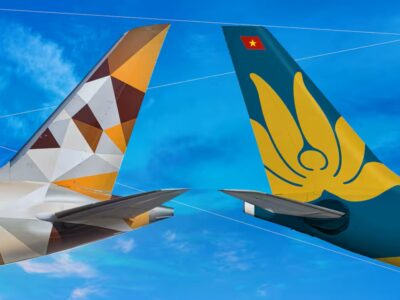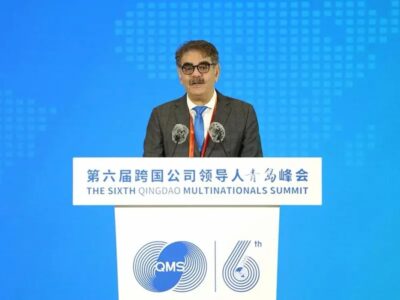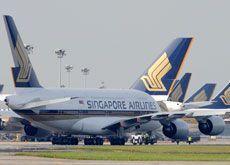Goh Choon Phong, the incoming CEO of Singapore Airlines Ltd, will face growing competition for both premium and economy class passengers in Asia as he tries to revive profits from a two decade low.
Goh, 47, will take over the company in January, the carrier said on September 3. Middle East carriers including Qatar Airways Ltd and Emirates Airline are adding planes to win business class traffic while AirAsia Bhd and Qantas Airways Ltd’s Jetstar are focusing on cost conscious and first time leisure travelers.
K Ajith, an analyst at UOB Kay Hian Research Pte in Singapore, said: “The big question now is whether Singapore Air can still maintain their pricing power without losing out to rivals.”
He added: “Competitors are getting new aircraft and the service quality at Middle Eastern carriers is also improving. The low cost carriers are also expanding very quickly.”
Profit at Singapore Air, the world’s second largest airline by market value, sank 80 percent in the year ended in March as the worst recession in six decades prompted companies to cut premium travel and job losses led to a slump in leisure trips.
Goh also needs to bring back capacity cut during the recession without hurting yields, or the average price a traveler pays to fly one kilometer, said Ajith.
Christopher Wong, who oversees $45 billion assets, including Singapore Air shares, at Aberdeen Asset Management said: “He has got to take advantage of the growth in Asia.”
He added: “Goh will need to find ways to grow the pie, move Singapore Air to the next level, and stay relevant.”
The incoming chief executive has declined requests for an interview until after he takes over, said Nicholas Ionides, the carrier’s spokesman.
The airline had a net income of $161 million last fiscal year, preserving its record of posting an annual profit every year since the company went public in 1985.
Singapore Air may have a net income of S$1.3 billion in the year ending in March, according to the average forecast of 22 analysts compiled by Bloomberg. That’s still 39 percent lower than the record in the year ended in March 2007.
Singapore Air shares have gained 4.4 percent this year compared with a 15 percent increase for the Bloomberg Asia Pacific Airlines index.
Goh will join the airline’s board October 1. Current chief executive Chew Choon Seng will retire at the end of the year after seven years at the helm.
The new CEO needs to reassess the company’s focus on premium travel, said Andrew Miller, chief executive officer of CAPA Consulting LLC, which advises carriers. Singapore Air gets about 40 percent of its revenue from first and business class travel.
Qantas, Australia’s largest carrier, said this year it’s spending $366 million on a revamp that includes removing first-class cabins from some of its planes.
Miller said: “Is the premium market disappearing or growing at a slower rate?”
He added: “That’s a serious question for the CEO. If you look at Qantas, they are cutting back some of their premium seats and that’s a sign of the times.”
Emirates, the biggest Arab airline, is awaiting delivery of 203 planes worth more than $68 billion, while AirAsia, Southeast Asia’s largest discount carrier, has ordered 175 single aisle planes to expand in the region.
Cathay Pacific Airways Ltd, Thai Airways International Pcl, and Malaysian Airline System Bhd are also ordering planes. So are carriers in China and India, with a combined population of 2.6 billion people.
John Strickland, Director of JLS Consulting Ltd in London said: “Goh is looking at a climate which at the moment seems to be improving, but it’s certainly not back to where it was in the past.”
Goh will also have “to keep the focus on maintaining that quality reputation the company has,” he said.
Singapore Air has a five-star rating from Skytrax, which surveys airline passengers. In the 2010 World Airline Awards, the ratings company ranked the carrier as the world’s second best. It also bagged the No. 1 slot for best cabin staff, and the No. 2 slot for both business class and first class.
Goh, who holds three bachelor degrees from Massachusetts Institute of Technology, joined the company as a cadet administrative officer in 1990. He has also held several senior vice president positions in divisions including technology and finance. He ran the airline’s cargo unit for four years and is currently chairman of the SilkAir regional carrier.
One of the carrier’s three executive vice presidents, Goh in June began overseeing the company’s marketing and sales.
Shukor Yusof, Standard & Poor’s Singapore based editorial director said: “Goh’s age and experience are probably key factors in the selection process, notwithstanding his degree in cognitive science, a rather rare but highly useful skill for an airline CEO when faced with relentless challenges in the industry.”
Aberdeen’s Wong said: “He has a relatively low profile, but on paper, he looks like he has got the right credentials to deal with the challenges Singapore Air is facing.”








